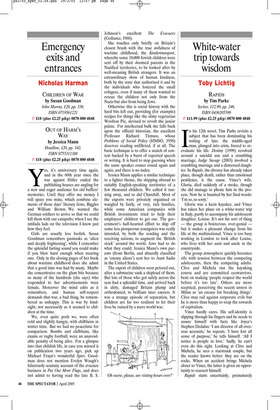Emergency exits and entrances
Nicholas Harman
CHILDREN OF WAR by Susan Goodman John Murray, £20, pp. 330, ISBN 0719561221 ✆ £18 (plus £2.25 p&p) 0870 800 4848 OUT OF HARM’S WAY by Jessica Mann Headline, £20, pp. 342, ISBN 0755311388 ✆ £18 (plus £2.25 p&p) 0870 800 4848 Yes, it’s anniversary time again, and in the 60th year since the war against Hitler ended the publishing houses are angling for a new and eager audience for old buffers’ memories. Until they offer me money I will spare you mine, which combine elements of those days’ literary lions, Biggles and William Brown. We wanted the German soldiers to arrive so that we could kill them with our catapults; when I see the intifada lads on the television I know just how they feel.
Girls are usually less foolish. Susan Goodman remembers gasmasks as ‘alien and deeply frightening’, while I remember the splendid farting sound you could make if you blew hard enough when wearing one. Only in the closing pages of her book about wartime childhood does she admit that a good time was had by many. Maybe she concentrates on the glum bits because so many of the hundreds (she says) who responded to her advertisements were female. Moreover the mind edits as it remembers, and human self-respect demands that war, a bad thing, be remembered as unhappy. This is war by hindsight, not necessarily as it seemed to children at the time.
We, even quite posh we, were often cold and slightly hungry, with chilblains in winter time. But we had no peacetime for comparison. Bombs and chilblains, like exams or rugby football, were an unavoidable penalty of being alive. For a glimpse into that childish life, in case you missed it on publication two years ago, pick up Michael Frayn’s wonderful Spies. Goodman does not mention Evelyn Waugh’s hilariously scummy account of the evacuee business in Put Out More Flags, and does not admit to having read the late B. S. Johnson’s excellent The Evacuees (Gollancz, 1968).
She touches only briefly on Britain’s closest brush with the true awfulness of wartime childhood, the Kindertransport, whereby some 10,000 Jewish children were sent off by their doomed parents in the Nazified territories, to be looked after by well-meaning British strangers. It was an extraordinary show of human kindness, both by the state that authorised it and by the individuals who fostered the small refugees, even if many of them wanted to rescue the children not only from the Nazis but also from being Jews.
Otherwise this is social history with the hard bits left out, providing (for example) recipes for things like the slimy vegetarian Woolton Pie, devised to revolt the junior palate. For intellectual bulk she falls back upon the official historian, the excellent Professor Richard Titmuss, whose Problems of Social Policy (HMSO, 1950) deserves reading unfilleted, if at all. The basic technique is to offer a snatch of context backed by a burst of reported speech or writing. It is hard to stop guessing when the same speaker comes round again and again, and there is no index.
Jessica Mann applies a similar technique to a lighter theme, the shipping abroad to suitably English-speaking territories of a few thousand children. We called it running away, and so did Churchill. Most of the exports were privately organised or wangled by fairly, or very, rich families, while some American companies with British investments tried to help their employees’ children to get out. The government’s half-hearted effort to ship off some less prosperous youngsters was really intended, by both the sending and the receiving nations, to augment the ‘British stock’ around the world. Jews had to do what they could; Jessica Mann’s own parents (from Berlin, and absurdly classified as ‘enemy aliens’) sent her to Aunt Sadie in the United States.
The export of children soon petered out, after a submarine sank a shipload of them. But lots of those who got safely across the seas had a splendid time, and arrived back in dirty, damaged Britain plump and orthodonted, to brilliant later careers. It was a strange episode of separation, but children are far too resilient to let their lives be ruined by a mere world war.





























































 Previous page
Previous page